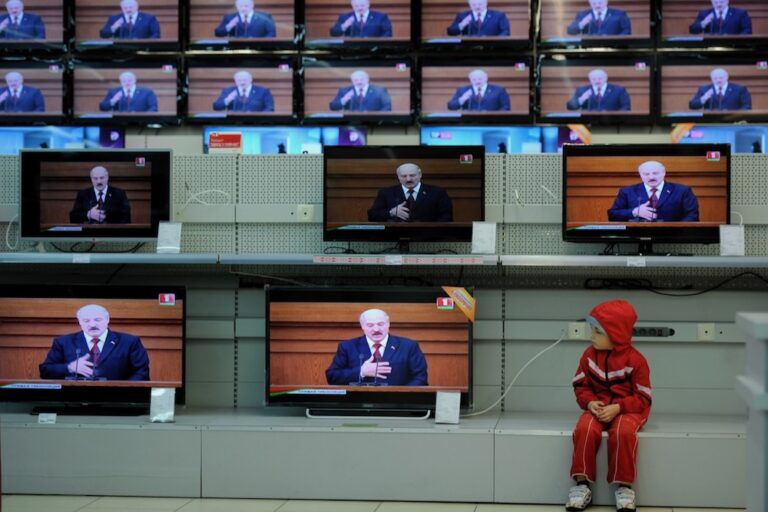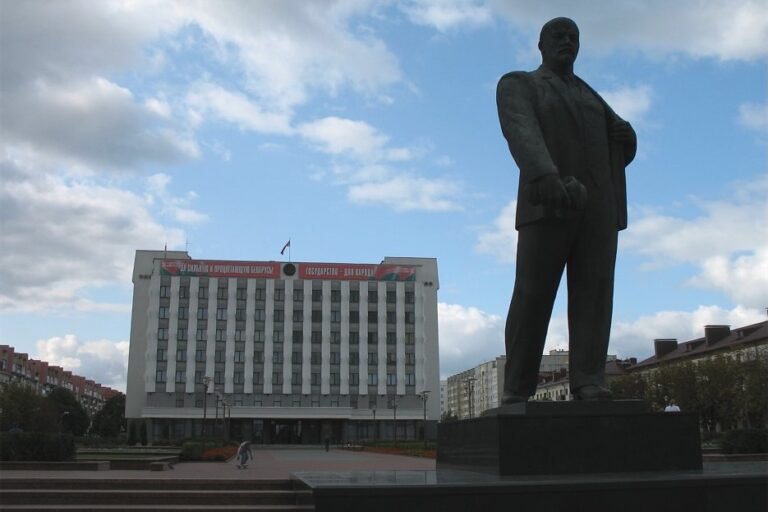(ARTICLE 19/IFEX) – “The Noose Tightens”, an ARTICLE 19 update on media freedom in Belarus, details a series of measures introduced in 1998 by the Belarus authorities which strengthen the already restrictive press regime and further undermine media critical of the government. Malcolm Smart, Deputy Director of ARTICLE 19 said: “ARTICLE 19 is particularly concerned […]
(ARTICLE 19/IFEX) – “The Noose Tightens”, an ARTICLE 19 update on media
freedom in Belarus, details a series of measures introduced in 1998 by the
Belarus authorities which strengthen the already restrictive press regime
and further undermine media critical of the government.
Malcolm Smart, Deputy Director of ARTICLE 19 said:
“ARTICLE 19 is particularly concerned about a series of restrictive measures
introduced in 1998. These tighten government control over media content and
seem to be geared towards securing a government monopoly on publishing,
reporting and commenting on official information.
“Belarus’s democratic transition is thrown into reverse by such steps, and
political participation is seriously undermined”, he continued.
A number of new measures in 1998, including some introduced through internal
governmental circulars, others as amendments to the highly restrictive press
law, are of particular concern:
official information, and public officials prohibited from formally
commenting on such information. The scope of such a prohibition is
potentially very broad, given the state’s wide involvement in public affairs
in Belarus.
decrees) by the non state media has, since March, required a government
licence from the Ministry of Justice. The conditions for obtaining such a
licence are extremely onerous (for example, a paper must have staff with
higher legal education, who must provide evidence of diplomas). It appears
that the state media is exempt from this regulation.
stringent requirements for registration of newspapers; authority for the
State Committee on the Press to suspend publication of a newspaper or
periodical for up to three months without a court ruling; and prohibiting
the use of media to publish ‘information damaging the honour and dignity of
government officials’.
implementing the notorious Article 5 of the Law on Press (stipulating
content restrictions) and so will have the power to act as a censorship
body. Its members are appointed by the government.
The new measures are already having an impact on the non state media’s
ability to provide information on matters of public interest. For example, a
correspondent of “Narodnaya Volya” attempted to find out from the Belarusian
Ministry of Emergencies how many of those people who carried out emergency
work in the contaminated zone around the Chernobyl reactor after the 1986
catastrophe are still alive. In response, she was told there was a provision
to refuse the non state newspapers access to any information. This has
particularly disturbing connotations in the light of past cover ups of
information on Chernobyl by the Soviet authorities, with disastrous results
for peoples’
lives and health.
The obstructions to press freedom described are only the most recent in a
continuing war of attrition against the press by the Belarus authorities.
ARTICLE 19’s previous report on Belarus, “One More Mirror Has Been Broken”
described the repressive regulatory regime faced by the press. Even before
the ratchet was tightened this year, existing regulations were used to
stifle critical voices. For example, in November 1997, the authorities
closed
“Svaboda”, a prominent non state newspaper, because of the content of
articles it had published.
The new measures add to the obstacles on the non state Belarusian media by
other laws, regulations and practices which infringe Belarus’s obligation
under international law to uphold freedom of expression. Belarus has treaty
obligations as a State Party to the International Covenant on Civil and
Political Rights (ICCPR) and regionally, as a member of the Organization
for Security and Co operation in Europe (OSCE).
The UN has been critical of the Belarus government’s respect for freedom of
expression, even before the latest set of measures: the UN Special
Rapporteur on freedom of expression raised fundamental concerns about the
situation last year, and the UN Human Rights Committee censured the
government’s record on human rights in October 1997. The OSCE established an
office in Belarus in February 1998 to assist Belarus in its democratic
transition.


